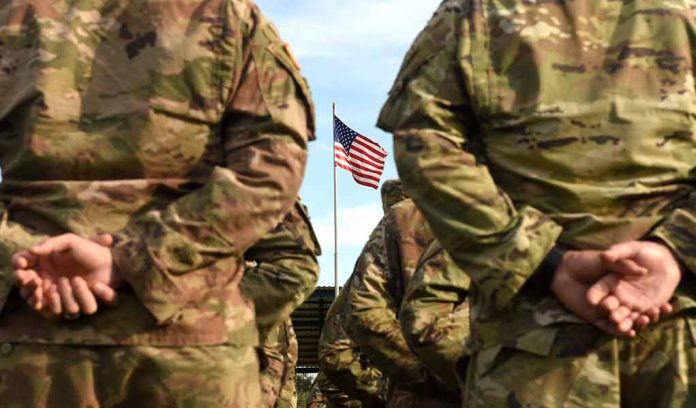
Defense Secretary Pete Hegseth’s military reform plans, which focus on shifting from social policies back to combat readiness, are reshaping the future of US armed forces.
Key Takeaways
- Hegseth is addressing issues related to military fitness and weight standards.
- An estimated 68% of National Guard and reserve troops are overweight, posing readiness challenges.
- A review of grooming and physical fitness standards has been initiated to assess readiness impact.
- The ASP study highlights that overweight troops could limit deployment capabilities.
- Hegseth emphasizes a focus on military personnel being “fit, not fat.”
The Challenge of Fitness Standards
Defense Secretary Pete Hegseth is acknowledging a critical concern: a large portion of the military, notably the National Guard and reserves, is struggling with fitness and weight standards. Reports suggest 68% of troops are overweight, which could jeopardize readiness and deployment capabilities. This reality is alarming for national security, as active-duty forces shrink and reliance on reserves grows.
The American Security Project (ASP) study found that obesity rates could severely impede operational effectiveness. As Secretary Hegseth puts it, “Troops need to be fit, not fat.” His administration has launched a comprehensive review to assess the influence of fitness and grooming standards on military readiness.
Thank you, @elonmusk & @grok AI!
Your explanations and conclusions below are on point regarding the double standards of justice related to anthrax-era Service Member record corrections vs COVID.
Hopefully @SecDef @PeteHegseth and @DoD_USD_PR, or @POTUS @realDonaldTrump and the… pic.twitter.com/IhrUbeKTJE
— Thomas Rempfer (@rempfer_thomas) March 10, 2025
Impact on Combat Readiness
Hegseth, in a move supported by many, argues that military focus should pivot back to combat readiness, distancing from the broad social agendas previously promoted. Changes aim to hold personnel to stringent traditional disciplines. ASP researchers recommend further research and updates to health records for effective monitoring and addressing of obesity-related health challenges among reservists.
According to ASP researchers, “With the diminished size of the [active-duty] force and increasing demands on the National Guard and reserves, service members separated due to obesity and its comorbidities are vital personnel the Armed Forces cannot afford to lose.”
Reforming enlistment and retention standards is a priority under Hegseth. Emphasizing the vitality of reversing the trend of weight issues, new policies may reshape perceptions of military readiness. They signal a strategic shift intended to fortify national security with a leaner, more combat-ready force.
A Return to the “Warrior Ethos”
Comprehensive reviews on grooming and fitness standards pave the way for potential policy shifts. Hegseth’s reforms have reignited debates on balancing combat readiness against inclusivity and diversity. Examples include recent pre-boot camp training programs intended for recruits who initially fail physical fitness standards while keeping core graduation requirements unchanged.
Journalist Ward Clark recalls that, “When I wore Uncle Sam’s colors back in the closing years of the Cold War, we took a lot of pride in being STRAC – ‘Strategic, Tough, Ready Around the Clock.’ Not only physical fitness but appearance factored into that; we took pride in looking sharp, in looking soldierly.”
Hegseth’s efforts mark a definitive attempt to realign America’s military with traditional warrior values. Whether these policies will withstand the test of political discourse remains to be seen, but they underscore the importance of re-evaluating what it means to be combat-ready in today’s geopolitical climate.
Sources:
- https://redstate.com/bobhoge/2025/04/28/hegseth-has-a-big-fat-problem-with-the-national-guard-and-reserves-n2188451
- https://www.foxnews.com/politics/hegseth-vows-crackdown-military-obesity-after-shocking-reserve-guard-report
- https://www.militarytimes.com/news/pentagon-congress/2025/04/24/more-than-two-thirds-of-reserve-troops-are-overweight-report/
- https://thehill.com/policy/defense/5267720-reserve-troops-weight-standards/



